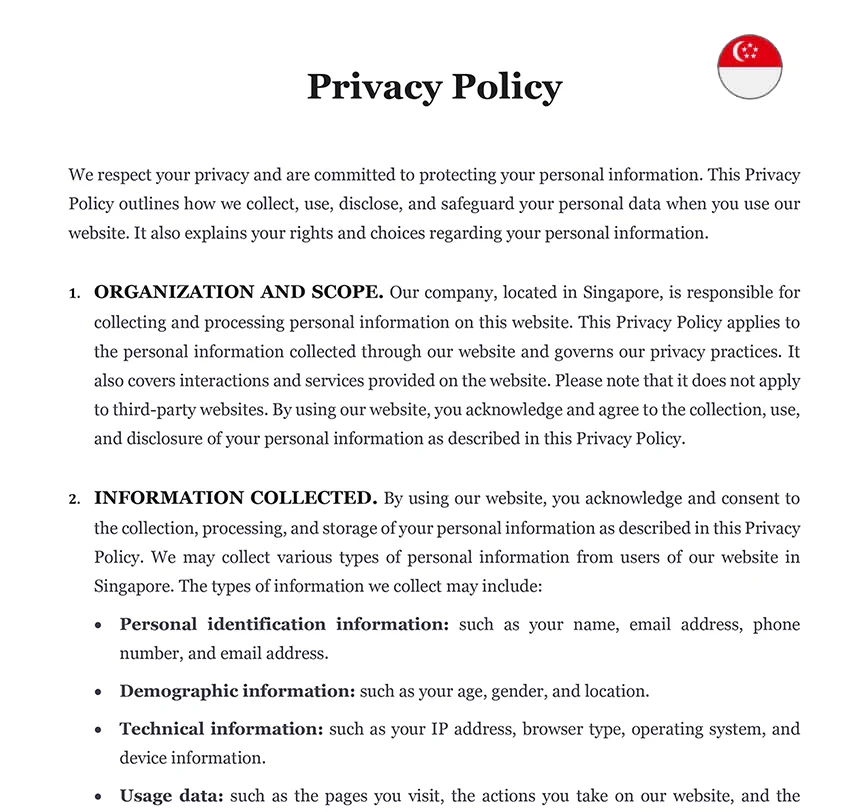Ready to use legal template
Drafted by experienced lawyers
Compliant with Singapore law
Ready to use legal template
Drafted by lawyers
Compliant with Singapore law
Home › Intellectual property › Privacy Policy
Learn more about Website Privacy Policy in Singapore
A Website Privacy Policy is a vital legal document that outlines how a website or mobile app collects, uses, and protects users’ personal data in Singapore. It is essential for businesses to comply with data protection laws and demonstrate transparency in handling user information. Themis Partner offers an easy-to-edit legal template for a Website Privacy Policy, expertly drafted by lawyers in accordance with Singaporean laws. With this comprehensive template, businesses can safeguard user privacy, build trust with their audience, and ensure compliance with data protection regulations. Protect your users’ data and enhance your website’s credibility with the help of Themis Partner’s user-friendly and legally sound Website Privacy Policy template in Singapore.
Table of contents
-
What is a Website Privacy Policy in Singapore?
-
Why do I need a Website Privacy Policy for my website in Singapore?
-
What does a Website Privacy Policy include?
-
How can a Website Privacy Policy protect user data in Singapore?
-
Is a Website Privacy Policy legally required in Singapore?
-
How often should I update my Website Privacy Policy?
What is a Website Privacy Policy in Singapore?
A Website Privacy Policy in Singapore is a legal document that outlines how a website collects, uses, discloses, and manages personal information of its users. It explains the types of data collected, such as names, email addresses, or browsing history, and the purposes for which the data is used. The Privacy Policy also highlights how the website ensures the security of the collected data and how users can exercise their rights regarding their personal information. Having a comprehensive and transparent Privacy Policy is essential for websites in Singapore to comply with data protection laws and to build trust with their users.
Why do I need a Website Privacy Policy for my website in Singapore?
Having a Website Privacy Policy is crucial for your website in Singapore for several reasons:
1. Legal Compliance: Singapore has strict data protection laws, including the Personal Data Protection Act (PDPA), which requires businesses to inform users about the collection and use of their personal data. A Privacy Policy helps you comply with these regulations.
2. Transparency: A Privacy Policy demonstrates your commitment to being transparent about how you handle users’ personal information. It builds trust with your website visitors, reassuring them that their data is being handled responsibly.
3. User Awareness: By providing clear information about data collection and usage, users are aware of what information they are sharing and why, empowering them to make informed decisions.
4. Avoid Legal Issues: Having a Privacy Policy can help you avoid legal disputes and potential fines resulting from non-compliance with data protection laws.
5. Protect Your Business: A well-drafted Privacy Policy can outline the steps you take to safeguard user data, protecting your business from potential data breaches or unauthorized access.
6. Third-Party Services: If your website uses third-party services like Google Analytics or advertising networks, a Privacy Policy is essential to inform users of these integrations.
ℹ️ Overall, having a comprehensive and up-to-date Privacy Policy not only helps you comply with the law but also shows your commitment to user privacy and data protection.
What does a Website Privacy Policy include?
A Website Privacy Policy in Singapore typically includes the following key elements:
1. Data Collection
Information about the types of personal data collected from users, such as names, email addresses, contact details, IP addresses, and cookies.
2. Purpose of Data Collection
Explanation of why you collect users’ personal data and how it will be used, such as for website functionality, analytics, marketing, or communication purposes.
3. Consent and Rights
Details on how users can provide consent for data collection and their rights to access, update, or delete their personal information.
4. Data Sharing
Information on whether and with whom you share users’ data, such as third-party service providers, advertisers, or government authorities.
5. Cookies and Tracking Technologies
Disclosure of the use of cookies, web beacons, and other tracking technologies, along with the purpose and duration of data retention.
6. Security Measures
Explanation of the security measures in place to protect users’ data from unauthorized access, data breaches, and other risks.
7. Third-Party Links
Disclosure of any external links to third-party websites or services and a disclaimer about their privacy practices.
8. Children's Privacy
If your website is not intended for children under a certain age, a statement confirming that you do not knowingly collect information from minors.
9. Changes to Policy
Information on how you will notify users of any updates or changes to the Privacy Policy.
How can a Website Privacy Policy protect user data in Singapore?
A Website Privacy Policy in Singapore can protect user data through various means. It promotes transparency by clearly outlining the types of personal data collected and its intended purposes, informing users about data handling practices. The Privacy Policy explains how users can provide consent for data collection and processing, ensuring explicit permission is obtained before using their data.
It empowers users by providing information about their rights to access, update, or delete their personal information, giving them control over their data. By describing implemented security measures, the Privacy Policy instills confidence in users that their data is protected from unauthorized access and potential breaches. Ensuring compliance with Singapore’s data protection laws, such as the Personal Data Protection Act (PDPA), demonstrates a commitment to upholding legal requirements regarding data privacy.
If the website shares user data with third parties, the Privacy Policy discloses this information and informs users about the purpose and recipients of data sharing, ensuring transparency. For websites using cookies or tracking technologies, the Privacy Policy explains their purpose and provides options for users to manage their preferences. If the website is not intended for children under a certain age, the Privacy Policy can include a disclaimer stating that data from minors is not knowingly collected.
ℹ️ Having a comprehensive and well-drafted Privacy Policy establishes trust with users, promotes responsible data handling practices, and helps meet legal obligations related to data privacy in Singapore.
Is a Website Privacy Policy legally required in Singapore?
Yes, a Website Privacy Policy is legally required in Singapore if your website collects, uses, or processes personal data. Singapore’s data protection laws, specifically the Personal Data Protection Act (PDPA), govern the collection, use, and disclosure of personal data in the country. The PDPA aims to protect individuals’ personal data and promote responsible data management practices by organizations.
Under the PDPA, organizations are required to inform individuals about the purposes for collecting their personal data and obtain their consent for such collection and processing. This requirement typically necessitates the presence of a Privacy Policy on the website that outlines the data collection practices, purposes, and how users can provide consent.
The Privacy Policy must also disclose information about how individuals can access, correct, or withdraw their consent for the use of their personal data. It should also address data security measures and data sharing practices with third parties.
- Remarks:
Failing to comply with the PDPA’s requirements can result in significant penalties and fines for the organization. Therefore, having a Website Privacy Policy that aligns with the PDPA is essential for legal compliance and to build trust with users regarding the handling of their personal data in Singapore.
How often should I update my Website Privacy Policy?
The frequency of updating your Website Privacy Policy depends on several factors, including changes in data processing practices, legal requirements, and updates to your website’s features or services. As a general guideline, it is recommended to review and update your Privacy Policy at least once a year. However, certain events may trigger the need for more frequent updates. Here are some scenarios that may prompt you to update your Privacy Policy:
| ➤ Changes in Data Practices: If you modify how you collect, use, or share user data, your Privacy Policy should be updated to reflect these changes. |
| ➤ Legal Requirements: Whenever there are updates or changes to data protection laws in Singapore or other relevant jurisdictions that impact your website's data processing practices, you should ensure that your Privacy Policy is in compliance with these laws. |
| ➤ New Features or Services: Introducing new features or services on your website that involve the collection or processing of personal data may require updates to your Privacy Policy. |
| ➤ Data Security Measures: If you implement new security measures to safeguard user data, you should include these updates in your Privacy Policy. |
| ➤ Third-party Partnerships: If you start sharing user data with new third-party partners or change your data sharing practices, your Privacy Policy should reflect these updates. |
| ➤ User Feedback or Complaints: If users provide feedback or raise concerns about your Privacy Policy, it may be a signal that revisions are necessary to address these issues. |
| ➤ Mergers or Acquisitions: In the event of a merger or acquisition that affects data processing practices, updating your Privacy Policy is essential. |




